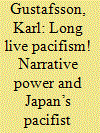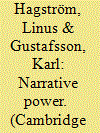| Srl | Item |
| 1 |
ID:
167609


|
|
|
|
|
| Summary/Abstract |
International relations research acknowledges that states can have different security policies but neglects the fact that ‘models’ may exist in the security policy realm. This article suggests that it is useful to think about models, which it argues can become examples for emulation or be undermined through narrative power. It illustrates the argument by analysing Japan’s pacifism—an alternative approach to security policy which failed to become an internationally popular model and, despite serving the country well for many years, has even lost its appeal in Japan. Conventional explanations suggest that Japan’s pacifist policies were ‘abnormal’, and that the Japanese eventually realized this. By contrast, this article argues that narratives undermined Japan’s pacifism by mobilizing deep-seated beliefs about what is realistic and unrealistic in international politics, and launches a counter-narrative that could help make pacifism a more credible model in world politics.
|
|
|
|
|
|
|
|
|
|
|
|
|
|
|
|
| 2 |
ID:
167604


|
|
|
|
|
| Summary/Abstract |
We are living at a time when people appear to have become more aware of the power of narratives in international politics. Understanding how narratives exercise power is therefore more pertinent than ever. This special issue develops the concept of narrative power for international relations research by focusing on East Asia—the region that has been at the centre of debates about international power shifts since the 1990s. This introduction seeks to elucidate and define four key binary distinctions: (a) narrative power as understood from the perspective of an individualist versus a narrative ontology; (b) narrative power as explanandum versus explanans; (c) narrative power as more prone to continuity or change; and (d) the scholar as a detached observer of narrative power versus the scholar as a narrative entrepreneur and a potential wielder of power. Informed by the individual contributions, the introduction demonstrates how and with what implications research on narrative power can negotiate and traverse these binary distinctions.
|
|
|
|
|
|
|
|
|
|
|
|
|
|
|
|
| 3 |
ID:
167608


|
|
|
|
|
| Summary/Abstract |
The purpose of this article is to analyse how the seemingly natural fit between Japan and the soft power concept has been possible despite the notorious vagueness of the concept and what the consequences of soft power’s reification are. By building on recent scholarship on concepts, expert knowledge and narratives, the article suggests that reification processes are best conceptualized as driven by concept coalitions. The article finds that soft power was narrated and nurtured into Japan’s cultural diplomacy, Japan’s relationship with the United States (US) and its security policy. The article, moreover, shows that the more soft power was understood, framed and accepted as benign and necessary, the more persuasive arguments about what Japan should do or be in order to wield soft power became. This has legitimized narratives that suggest that Japan’s 'proactive contribution to peace’ as a responsible ally of the US constitutes an inevitable source of soft power.
|
|
|
|
|
|
|
|
|
|
|
|
|
|
|
|